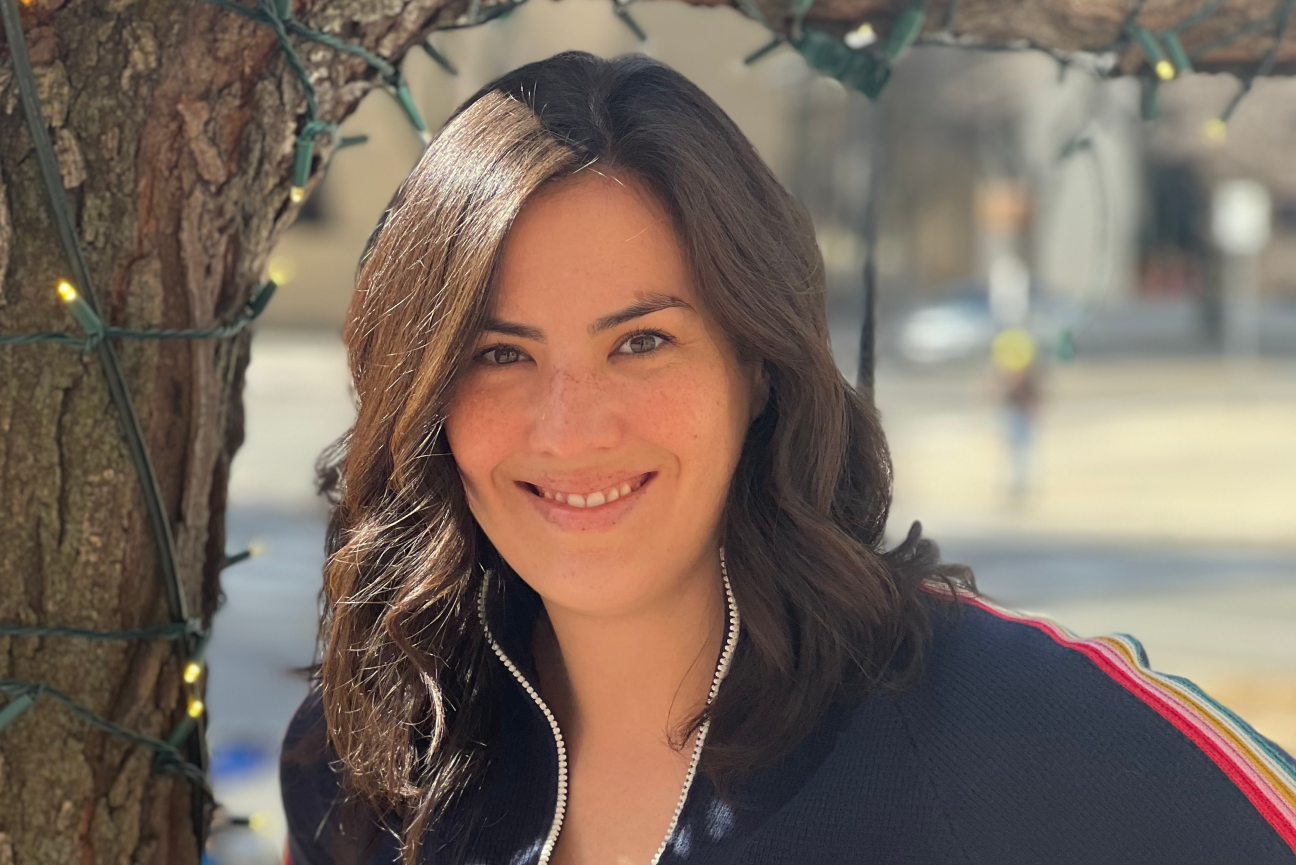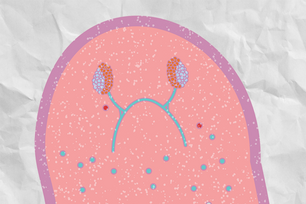
Courtesy of Sheri Grill
Meet a Whitehead Postdoc: Sheri Grill
Sheri Grill is a postdoc in Whitehead Institute Director Ruth Lehmann’s lab studying germ cells, the cells that become eggs and sperm. We sat down with Sheri to learn more about her and her experiences in and out of the lab.
What are you investigating?
I work on germ cells, which are the cells that eventually become the egg and sperm. I use the fruit fly as my model organism for this, but the mechanisms that I'm looking at have been retained throughout evolution and so are similar from flies to humans. Germ cells are really the only cells that are or have the potential to be truly totipotent, which is when a single cell is capable of becoming any other cell—or every other cell—in our body. Even stem cells are maybe at best multipotent, which means they can turn into some different types of cells in your body, but not every type of cell in your body. However, a germ cell can become an egg, which once fertilized can grow into an entire new body. Every other cell type will die with the body, but the germ cells can be passed down and become the next full being. Getting into the more nitty-gritty stuff, I'm really looking at how these germ cells transcribe the correct genes that give them their identity. What's the actual genetic regulation of totipotent potential?
What did you want to be as a little kid?
I wanted to be a doctor—not a doctor of science, but a medical doctor that helps people. That’s what I always expected to be, with the side note that I also had a desire or dream to be a singer. The type of singer varied with my age, from popstar to opera to musical theater. In college, I got a degree in music as well as in science. However, the assumption was that I would become a doctor, and maybe do something musical as well.
When did you realize you wanted to pursue a career in science?
I always had an interest in science, but whether because of society or television, I thought the trajectory for a person interested in science was to go into medicine. Starting as a freshman in college, I worked in a lab that did stem cell work in plants. I enjoyed doing research and I knew it would help on medical school applications. I kept thinking, “I'm going to stop doing research at some point during my undergrad so I can focus on more medical stuff,” and I never did. I just loved it so much. Then, when I was applying for medical school the summer before my senior year of college, I thought I should probably step foot in a hospital at some point, so I took a two week break from research and shadowed a few cardiothoracic surgeons. I hated it. It really was not for me. I saw a surgery that went wrong with a young guy with a family, and that was difficult. I also just wasn’t drawn to the process. I realized that research was not a stepping stone to becoming a doctor; it was the thing I actually loved. So luckily, because medical school applications are due before graduate school applications, I was able to pivot. I haven’t looked back since. Thank goodness I spent those two weeks in the hospital though.
Is music still a big part of your life?
Yes, it will always be a love of mine. I grew up singing and playing flute. I’m not performing currently, although I’d like to get back into that someday, but listening to music is my happy place. Music is my way to calm down, as well as to get excited.
What do you listen to?
My go-to is always going to be Taylor Swift, which is a little bit of a trope nowadays, but I don't care. There's nothing like her music to make me feel happy or calm. She’s such a talented songwriter. Then as far as raw talent, Adele and John Legend are just amazing to listen to because they're so good. Another favorite of mine is Sarah Bareilles. There's no better on Broadway than Sarah Bareilles right now.
Other than music, what are your hobbies?
I play a lot of volleyball. That’s really what I spend my time doing outside of lab and my main thing that I love to do. I play with the MIT women's club team here. I have practices multiple times a week and then tournaments on the weekend. I started playing back in middle school. I come from an athletic family, and a very competitive family—my mom was a ranked racquetball player, who trained with the USA National team and won multiple world tournaments and stuff like that. When we were young, we played a lot of sports, and volleyball is the one I stuck with. It's been the one constant in my life that I would say I truly cannot live without. During the pandemic there was a period when I couldn’t play, and that was brutal. It's been great being here in Boston, because although I played in grad school, I didn’t have an actual coach or tournament team. It’s been really nice to have that again.
You mentioned your competitiveness. Do you feel like that comes into play in a research career?
Definitely. I think research is inherently a competitive field. I don’t mean that necessarily in the sense that it's everyone versus everyone, although obviously in science, there's always a desire to be first to the punch. You don't want to get scooped, so there is competition there. However, research is so much about collaboration. I actually feel that research is like a team sport. You have to work really hard together to see how far you can take the science. As a team, you are competing, in a sense, to push the science forward. I think there is an inherent competitiveness to pushing boundaries, to breaking through. I think that’s where playing sports and being a competitive person has helped me, because it feels comfortable for me to push as much as I can.
Your husband is also at Whitehead Institute. What is it like working at the same Institute?
Yes, my husband, Eric, is a postdoc in Iain Cheeseman’s lab. Personally, I love it. We worked in the same building in graduate school, so we were pretty used to it. Then I came here while he was still at Northwestern. We were doing long distance during the pandemic, which was awful, so by the time he finally got to Boston, I was thrilled to have him here and in the building. A really great part is, because we’re both postdocs, we both understand the career trajectory and its difficulties, so we are understanding when the other is in the lab on weekends or late at night. Also, we get to eat lunch together every day. That makes me feel a lot less guilty or stressed about going to volleyball at night, and the same for him with his hobbies. It allows space for us to see each other, and spend quality time together, and still have lots of independent things that we love to do.
What’s your favorite meal to cook?
I am a baker. My husband's the cook; I rarely use the stove unless it's to be put into a bake. I love to bake everything, but dark chocolate is my favorite flavor. I am gluten free for medical reasons, and when I found out that I would have to become gluten free, it became a necessity to figure out how to bake things that I could eat. It took maybe a year or two before I really embraced it, but now I bake all the time. I used to bake off of recipes that I could find, with modifications to make them gluten free. Now I have enough of a foundation of casually baking that I'm slowly trying to create recipes, and I’ve found that that is much harder. I like to bake for the lab. There happens to be another gluten free person in the Yamashita Lab, which shares the same lab space as us. It’s nice when anybody likes my bakes, but there's a particular kinship to having another gluten free person saying, “Oh, I never get to eat this” or telling me that something is a real treat for them. That’s been really nice.
Where do you see yourself in ten years?
Hopefully, I'll be a principal investigator at an institution. I would love to be back in the Midwest. That’s where I went to school, and my family and my husband’s family are there. As far as scientifically, I’d really love to be able to pinpoint the mechanisms that help germ cells keep their totipotent programming, with the very long-term goal of maybe one day—this is way past ten years now—being able to take a cell from anyone’s body and turn that into an egg or sperm. That would allow people with fertility problems, infertility, sterility, same sex couples, anyone who cannot biologically reproduce, to be able to do so.
Contact
Communications and Public Affairs
Phone: 617-452-4630
Email: newsroom@wi.mit.edu


